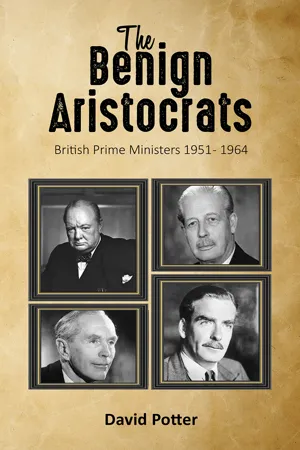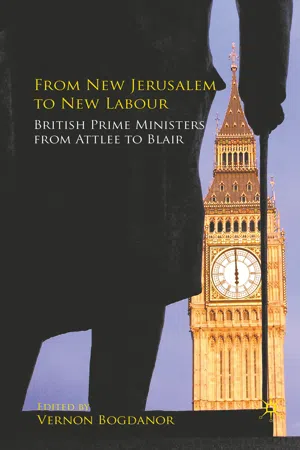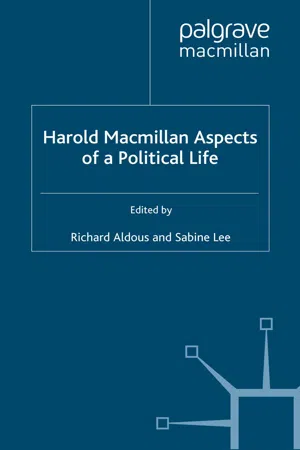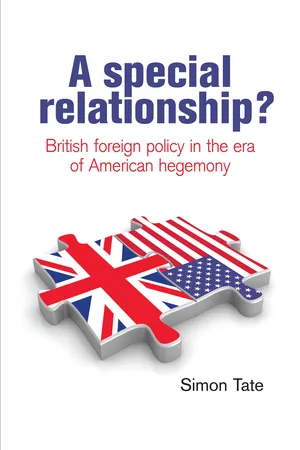History
Harold Macmillan
Harold Macmillan was a prominent British politician who served as Prime Minister from 1957 to 1963. He is known for his efforts to modernize British society and for his "wind of change" speech, which acknowledged the decolonization of Africa. Macmillan's tenure also saw significant social and economic changes in Britain, including the "affluent society" and the "never had it so good" era.
Written by Perlego with AI-assistance
Related key terms
1 of 5
4 Key excerpts on "Harold Macmillan"
- Available until 14 Jan |Learn more
The Benign Aristocrats
British Prime Ministers 1951 - 1964
- David Potter(Author)
- 2022(Publication Date)
- Austin Macauley Publishers(Publisher)
Chapter FiveHarold Macmillan
If there were ever a League table drawn up about who was the best British Prime Minister of the twentieth century, then the two Harolds would be high up, although the winner would really have to be the unassuming Clement Attlee who quietly changed the world. Harold Wilson was the Labour Prime Minister from 1964 to 1970, and from 1974 to 1976 and Harold Macmillan the Conservative one from 1957 to 1963. Sarcastically called “Supermac” by his enemies, Harold Macmillan nevertheless lived up to that billing, certainly in the early part of his Premiership where he could quite simply do no wrong. His demise was not entirely his fault, and possibly came at the right time for the ageing and ailing Macmillan in any case.Harold Macmillan was born at 52 Cadogan Place, Chelsea, London on February 10, 1894. Like Churchill, his mother was American, in her case from Indiana and his father Maurice Macmillan was English. His grandfather Daniel Macmillan was Scottish, having come from the Isle of Arran and he had been the founder of the Macmillan printing firm in 1843, into which the wealth of the family was bound up. Macmillan differs then immediately from the other three Conservative Prime Ministers of this era in that although, he and his family were undeniably rich, his wealth did not come from the land. It was from business and a very profitable, wealthy and now long-established business at that. It has now lasted more than 175 years, producing all sorts of books including school textbooks. If anything, and purely comparatively speaking, Harold was the poorest, in worldly terms, of all the four Prime Ministers of this era!Harold was the third son of the family. His early life was not luxurious exactly but it was certainly comfortable (or slightly more than that) with servants, nursemaids and cooks. Perhaps it was the Scottish influence on the family, but great stress was laid on education. Even before he went to Prep school he had started to learn French and Latin – French in his home from several French nursemaids and Latin at the School of Mr Gladstone (no apparent relation of the quondam Prime Minister) nearby. He also learned his physical education at a Gymnasium and Dancing Academy. - eBook - PDF
From New Jerusalem to New Labour
British Prime Ministers from Attlee to Blair
- V. Bogdanor(Author)
- 2016(Publication Date)
- Palgrave Macmillan(Publisher)
2 Thirdly, Macmillan presided over the second post-war phase of the ending of Empire, a process hastened by sympathetic Colonial Secretaries such as Iain Macleod and Reginald Maudling, however unpopular this made them or Macmillan with Conservative backwoodsmen. Churchill, for one, was horrified by the ‘Winds of Change’ speech Macmillan made in South Africa in 1960. Fourthly, Macmillan – in his Disraelian guise – presided for most of his premiership over a period of economic stability, full employment and a vast improvement in ‘the condition of the people’. In his famous Crystal Palace speech of 1872 Disraeli proclaimed that the people of England would be foolish ‘if ... they should not have long perceived that the time had arrived when social 1 Peter Mangold (2006) The Almost Impossible Ally: Harold Macmillan and Charles de Gaulle, I.B. Tauris. 2 Harold Macmillan (1972) Pointing the Way , Macmillan, p. 410. 62 D.R. Thorpe and not political improvement is the object which they ought to pursue’. It was not a mistake Macmillan was to make between 1957 and 1963. At the time of the 1959 election, The Times observed: ‘People are prosperous; prices are steady; unemployment is low.’ Only when the economic climate deteriorated in 1961 did the political tide begin to turn and the troubles begin. Macmillan’s anten- nae were so finely tuned that he was one of the first to see the unsustainability of much of this material progress, as shown in his infamously misinterpreted Bedford speech of July 1957 about the British never having had it so good. ‘What is beginning to worry some of us,’ he actually warned, ‘is “Is it too good to be true?” or perhaps I should say “Is it too good to last?” ’ 3 On 28 May 1962 he admitted to his Cabinet that his dream of keeping in the air the four balls of full employment, stable prices, a strong pound and a balance of payments in surplus was doomed to failure. - R. Aldous, S. Lee, R. Aldous, S. Lee(Authors)
- 1999(Publication Date)
- Palgrave Macmillan(Publisher)
As he confronted this power, what experience could Macmillan draw on? Harold Macmillan was remarkable among British Prime Minis- ters in having taken a serious personal interest in the Soviet Union at a very early stage in his career. His interest was, in some ways, typical of his generation and to the end of his life he retained many of the instincts of that generation. These were the young men who, born into the gentle life of the well-bred comfortably endowed families of pre-1918 England, had survived, scarred by years in the trenches, to experience the disillusion of the post-war depression and the apparent inability of a capitalist system to provide adequately for the British people. There were few of them for whom Communism had any real appeal, but many felt that a political system which purported to harness all the power of the state to the welfare of the people at least merited closer examination. Macmillan summed up their feelings well when he wrote in Winds of Change 1 'While the capitalist world seemed, to many observers, in decay if not in mortal agony, the Bolsheviks had apparently consolidated their power and stability. In the early years of my political life, Bolshevism was regarded in Britain with feelings ranging between contempt and fear. But by 1932 many British people were beginning to wonder whether, after all, the regime which had imposed itself over a vast part of the world's territory might not be worth careful and, if possible objective, study.' At the end of 1929 the first Ambassadors had taken up resi- dence in London and Moscow. On the first of January 1930 the Macmillan and the Soviet Union 197 Daily Worker had been founded. And in September 1932, after a brief flirtation with Oswald Mosley's proto-fascist New Party, the young Macmillan, re-elected in the Conservative landslide of 1931, set sail on a Soviet ship at the start of a five-week exploration of the Soviet Union. He was accompanied by Allan Young, an ex- Marxist from the Clyde.- eBook - PDF
A special relationship?
British foreign policy in the era of American hegemony
- Simon Tate(Author)
- 2024(Publication Date)
- Manchester University Press(Publisher)
In practical terms, this turning back of time meant trying to re-affirm British hegemony in Europe and trying to manage decolonisation in Africa in such a way as to re-establish the idea of there being an Anglo-American hegemonic division of labour – with the British government acting as a bridge between the US and other disparate, but strategically important, governments in these regions. In much the same way as the final case study of the War on Terror elucidates how Blair’s government was mired in the assumptions of the Second World War, equating the War on Terror with a replay of the Second World War, recasting Saddam as a second Stalin or Hitler and Bush as a second Roosevelt (Marquand, 2003), this case study elucidates how the Macmillan government was also mired in the assumptions of the Churchill government, in which Macmillan served. As Gorst and Johnman ( 1996) suggest, one can attribute the failings of the Macmillan government to successfully achieve a replay of the foreign policy 89 Harold Macmillan and the special relationship role it sought to a failure to reconcile the dichotomy between its awareness of Britain’s changed post-war economic and geopolitical position and a lack of willingness to accept that this would be a major constraint on Britain’s world role. It also suggests that there was something of a selective memory operating in Macmillan’s government, with the successes of the Churchill government in its foreign policy often perceived as being greater than they actually were. Both factors are important because the geopolitical changes that Macmillan’s foreign policy failed to respond to represent the genesis of the foreign policy difficulties experienced by the Blair government’s foreign policy in 2001–2003.
Index pages curate the most relevant extracts from our library of academic textbooks. They’ve been created using an in-house natural language model (NLM), each adding context and meaning to key research topics.



